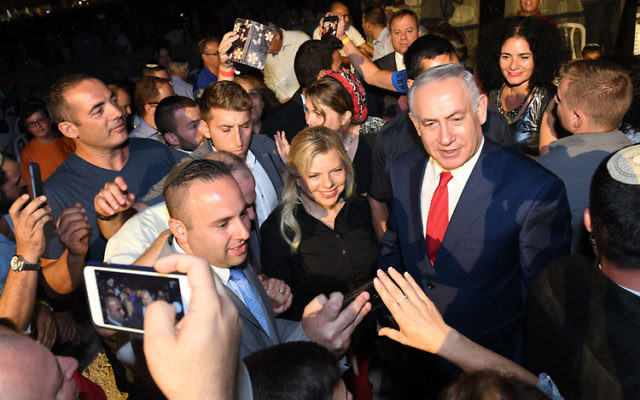Fresh arrests add to Bibi’s woes
ISRAEL has signalled that it may take matters in to its own hands and strike Iran’s growing range of military targets in Syria.

BENJAMIN Netanyahu’s former chief-of-staff has been arrested, in what a leading politician has called the biggest corruption case in Israel’s history.
Police officers are investigating Israel’s decision last year to buy submarines from the German shipbuilder ThyssenKrupp, suspecting corruption. Opposition politician Yair Lapid, who was Finance Minister at the time, has referred to the case as the “the biggest episode of corruption in the history of the state.”
The latest development adds to the headaches of Prime Minister Netanyahu. He is under police investigation in two other cases, one for allegedly receiving expensive gifts from businessmen and the other for allegedly trying to cut a deal with a newspaper to receive better press coverage.
Police arrested his former chief of staff David Sharan on Sunday, because he is suspected of corruption in the submarines case. This means that while Netanyahu has not been questioned in this affair — a saga which raises serious questions about how one of Israel’s largest ever defence purchases was decided upon — both his former aide and his personal lawyer have been.
The cousin and personal lawyer of Netanyahu, David Shimron, was also lawyer for Michael Ganor, the Israeli agent for shipbuilder ThyssenKrupp. Ganor is alleged to have bribed defence officials.
Sharan’s arrest on Sunday was followed by that of former cabinet minister Eliezer Sandberg on Monday. On Tuesday, it was revealed that Shai Brosh, former commander of an Israeli Navy unit, had also been arrested. The problem for an already-embattled Netanyahu is that in the eyes of many Israelis, if there was dirty dealing surrounding submarines, the PM will be dammed if he did know about it and damned if he was out-of-the-loop enough to not know.
Netanyahu’s image problems intensified in recent days, after the extent of his closeness to Israel Hayom, the newspaper that has traditionally applauded him, came to light. He was forced, by a freedom of information request, to reveal how often he spoke by phone to the newspaper’s owner Sheldon Adelson and its then-editor Amos Regev from 2012 to 2015.
He revealed late last week that he averaged 0.75 calls a week with the owner and 1.5 calls a week with the editor. Then this week it emerged that just before the 2015 general election conversations with Regev were as frequent as five times a day. Israeli commentators have suggested that when there were late-night calls, the next day there were front pages flattering to the PM or hitting out at his opponents.
The stakes in this phone call saga go beyond embarrassment. If Netanyahu is proved to have exerted editorial control over Israel Hayom, it could lead to the money spent on publishing it to be classed by Israel’s election authority as unauthorised campaign funding.
To add to the Netanyahu family’s woes, Channel 2 has reported that Sara Netanyahu is due to be indicted on corruption charges any day.
The Prime Minister’s answer to crises seems to be campaigning. Last week, The AJN reported on his enthusiastic speech to a settler gathering, which included a pledge never to evacuate settlements. Since this speech which helped to secure solidarity of settlers, he has been focussed on a popular fight of the right-wing in central Israel — making an unprecedented two visits in four days to South Tel Aviv to show opposition to illegal African immigrants.
He also just held a mass rally for his Likud party where he took aim at Israel’s media for “fake news” and presented himself as a victim, arguing that the media have taken aim at the party, not just him. He said that media are “doing everything to hurt me and my wife because they think that if they bring me or her down, they will bring down us, Likud.” The decision to hold the rally now, as well as his choice of comments, seem to be part of his great galvanisation project with the Israeli right.
What next for Netanyahu? Whether we are seeing a general popularity campaign or an early election campaign, one thing is almost certain. When he stands up to give his annual speech at the United Nations in a week-and-a-half, talking tough on Iran and other regional threats, he will be addressing the politicians and diplomats in the room, but at least in part making the next campaign speech for his audience back home.
NATHAN JEFFAY

comments